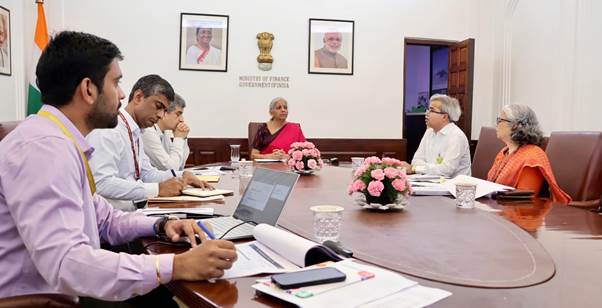New Delhi: Union Minister for Finance and Corporate Affairs, Nirmala Sitharaman, chaired a review meeting today to assess the Budgeted Capital Expenditure (Capex) of the Ministry of Railways (MoR) for the fiscal year 2024-25. This meeting is part of a series aimed at evaluating the Capex outlays of key ministries and departments following the Union Budget.
During the meeting, railway officials presented their capital expenditure plans and progress to the Finance Minister, outlining the initiatives aimed at expanding infrastructure and enhancing operational efficiency.
Sitharaman emphasized the government’s commitment to improving the “ease of living” for citizens and urged the Railways to prioritize capacity augmentation, safety, and commuter convenience. She highlighted the importance of doubling and electrifying existing railway tracks and laying new lines across the country, as envisioned in the Union Budget’s Capex allocation for the Railways.
In a significant step toward boosting logistics efficiency, the Interim Budget for 2024-25 has earmarked three major Economic Railway Corridors under the PM Gati Shakti initiative. These corridors aim to enhance multi-modal connectivity and reduce logistics costs through:
- Energy, mineral, and cement corridors
- Port connectivity corridors
- High traffic density corridors
Railway officials informed Sitharaman that 434 railway projects spanning 40,900 kilometers have been identified under the Economic Corridors, with a total investment of ₹11.16 lakh crore. These include:
- Energy, Mineral, and Cement Corridor (192 projects)
- High-Density Network Corridors (200 projects)
- Rail Sagar Projects (42 projects)
Of these, 55 projects, covering 5,723 kilometers, have already been sanctioned with an investment of ₹1.03 lakh crore. An additional 101 projects are set to be appraised this year under the Corridor Program.
The Finance Minister urged the Railways to expedite the rollout of Kavach, India’s indigenous Automatic Train Protection (ATP) system. Officials informed her that Kavach works are progressing across over 3,000 route kilometers on the Delhi-Howrah and Delhi-Mumbai sections. Notably, Kavach Version 4.0 has been successfully operationalized on the Kota–Sawai Madhopur section, with 108 kilometers completed at a record pace of 54 km per month.
Sitharaman also reiterated the importance of upgrading 40,000 normal rail bogies to Vande Bharat standards as announced in the Interim Budget 2024-25, to improve safety, comfort, and convenience for passengers.





